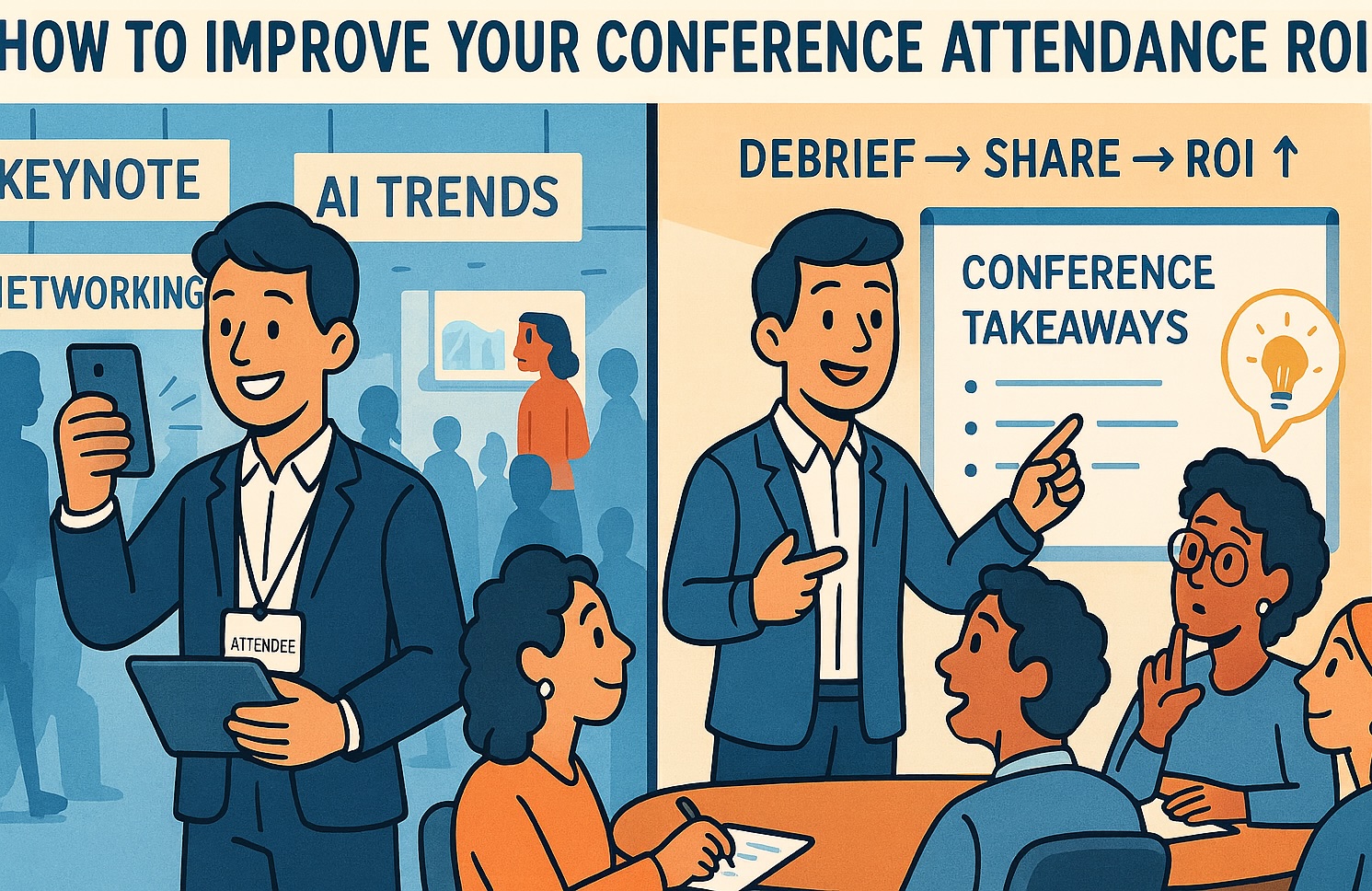A simple post-conference debrief can benefit both conference attendees and other team members who didn’t go, creating a better ROI for everyone (including a way conference organizers can benefit, too).

Conferences are one of the most underutilized opportunities people have. I’ve written prior articles on how to get the most out of conferences (The Ultimate Guide to Attending a Conference - Part 1 and The Ultimate Guide to Attending a Conference - Part 2 as well as What to Say at a Conference or Networking Event). These will all help the conference goer get the most out of the event. But did you know that there’s a simple activity you can do to improve the conference ROI for the whole organization?
I can’t always send my entire team to a conference. I may not have the budget and for larger teams it simply may not be optimal to do so. Suppose you have a team of thirty people who all use a project management tool which is having a user conference. Sending the person who is the admin of the tool may make sense, but sending the entire team probably isn’t the best use of time and money. Fortunately, you can still help your entire team without all that extra cost.
A conference might be $2,000 - $3,000 in cost (registration, flight, hotel, transportation, meals). You’re also losing work time, let’s say three days of work, for an additional few thousand in what you’re paying that employee for those few days (salary plus benefits). Ballpark, it might be $5,000 per person per conference in cost (although the out of pocket would be half that since you’re paying them either way).
To send five people out of a team of thirty would be $25,000 total in costs. In the long run this may be all worthwhile, which is why you’re willing to spend it. Spending $150,000 for the whole team to go may be a bit harder to do.
Now, imagine if you now took an additional hour for your whole team of thirty people to get together to debrief post conference. Call that $3,000 in additional costs for the meeting (hourly cost of thirty people at $100/hr). It’s not a huge cost, and again, it’s not a cash cost since you’re paying them to be in the office anyway (sadly, most people just don’t think of the “cost” of a meeting). During this hour, the conference goers provide highlights and summaries to the whole team. While the rest of the team may not have gotten quite as much value as if they could all go to the conference, on a per dollar or per hour unit cost is the best you’ll get from the event. This also helps the conference goers since the act of recall will help their retention, too.
If you want to take it further, have the attendees write up conference notes. I suggest they do this anyway, even if they’re not sharing. Writing down notes helps people retain what they learn and makes it more accessible later. As long as you’re writing it down, put it on a wiki or shared drive for everyone. You can do this in addition to or instead of the debrief meeting. These days you can also record the meeting (or transcribe it) so future team members can benefit; additional AI can summarize the meeting and key points for you. (Tip: if you’re going to use AI, create an audio call out similar to, “Hey, Siri” but something like “key idea” and when having AI summarize, tell it to explicitly note anything tagged as a “key idea.”) Again, the cost of having the few people who attended spend an hour or two making notes is relatively small but the benefit to the whole team is significant.
Keep sending your teams to conferences, and have them network when they get there (see What to Say at a Conference or Networking Event). Conferences are a very worthwhile long-term investment you need to make in your team as a whole and in the individuals. But as with all investments, there’s no reason you shouldn’t try to maximize your ROI.
Bonus for conference organizers: You can also do a post-event follow-up during which you have conference attendees share their takeaways. This can be asking people to submit three takeaways, or write a few sentences on their favorite talk. It can also be done as a small webinar (say per track) or pre-recorded 60-second video. Asking everyone to share will help them perform active recall of what they’ve learned, helping them better remember sessions, or to learn something from a session they missed (and for which they may not want to watch the whole hour long video). Equally important, it makes the conference-goers recall your brand even when outside of the conference. While AI can do some of the summaries and key points, asking people to do it helps the brand-equity of your event. Make this fun by giving away prizes and making it interactive, letting everyone feel as though they have something to contribute.
It’s critical to learn about corporate culture before you accept a job offer but it can be awkward to raise such questions. Learn what to ask and how to ask it to avoid landing yourself in a bad situation.
Investing just a few hours per year will help you focus and advance in your career.
Groups with a high barrier to entry and high trust are often the most valuable groups to join.